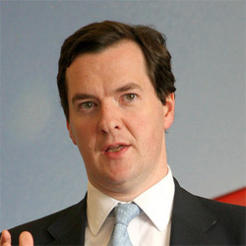Charities will no longer have to obtain signed gift aid declarations on the first £5,000 of small donations per year in order for those donations to qualify for the tax relief, Chancellor George Osborne announced in his Budget speech today.
Gift aid will be automatically applied to the donations of up to £10. Osborne said 100,000 charities would benefit from this to the tune of £240m.
The announcement was the first of a number of major new initiatives affecting charities which Osborne described as “the most radical reforms to charitable giving for more than 20 years".
He said the reforms would support giving, "from the largest donations to the coins collected in the charity bucket”.
“We will introduce a new scheme where gift aid can be claimed on small donations, up to a total of £5,000 a year per charity, without the need for donors to fill in any forms at all. That means gift aid on the contents of the collecting tin and the street bucket.”
The idea was mooted by the Philanthropy Review earlier this week.
The second reform was a change to inheritance tax that Osborne hoped would raise an additional £300m for the sector. Legators that leave more than 10 per cent of their estate to charity will see their inheritance tax rate reduced by 10 per cent, from 40 per cent to 36 per cent from April 2012. Osborne said: “I want to make giving 10 per cent of your legacy to charity the new norm in our country.”
According to the full Budget report, the relief is designed so that the benefit of the tax saving is reflected in the bequests received by charities and not in payments to other beneficiaries of the estate.
Another change will see gift aid benefit limits increased from £500 to £2,500 in order to allow charities and museums to spend more on thanking wealthy donors, in order to give them more leeway to persuade high net worth individuals to give more.
And he promised to introduce a system for online filing of gift aid claims by 2013. As a first step the government will shortly be publishing ‘intelligent’ forms (which contain automatic checks) for charities to use to apply for and claim tax reliefs.
The government pledged to explore how to increase the take-up of payroll giving and said it would continue to consult on implementation of a VAT exemption for services shared by VAT-exempt bodies, including charities. It will also open a new consultation on how to encourage the donations of pre-eminent works of art and historical objects to the nation in return for a tax deduction.
Another benefit is the extension of mileage rate claims to volunteers travelling in charity vehicles.
The future of the Community Investment Tax Relief has been assured too, after the government said it will
renotify the scheme to the European Commission and consult in advance of renotification on how it can be made more effective.
Osborne declared: “Together, these represent the most radical and most generous reforms to charitable giving for more than 20 years.
“Do the right thing for a charity, and the government will do the right thing by you.
“It’s a big help for the Big Society.”









